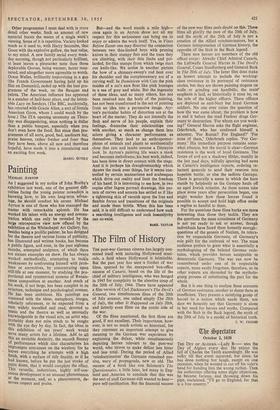The Film of History
THE post-war German cinema has largely con- tented itself with imitating Hollywood musi- cals, a field where Hollywood is inimitable. But the past year has seen a freshet of war films, spurred by the unexpected box-office success of Canaris, based on the life of the chief of military intelligence, who was hanged in 1945 for complicity in the abortive coup of the 20th of July, 1944. There have appeared a film version of Carl Zuckmayer's The Devil's General, two simultaneous films of the 20th of July atientat, one called simply The 20th of July, the other It Happened on July 20th, and latterly even films on the comic side of the war.
Of the films mentioned, the first three are good, if not excellent. Their importance, how- ever, is not so much artistic as historical, for they represent an important attempt to give meaning to the German war experience by explaining the defeat, while simultaneously depicting heroes relevant to the post-war world, who 'strove to make defeat less bitter and less total. During the period of Allied `reindoctrination' the Germans remained pas- sive, wary of propaganda, new or old. The success of a book like von Salomon's The Questionnaire, a little later, led many in Eng- land and America to conclude that this was the sort of stuff Germans still wanted to hear— pure self-justification. But the financial success of the new war films casts doubt on this. These films all glorify the men of the 20th of July, and the myth of the 20th of July is not a creation of the Allied reindoctrinators, but a German interpretation of German history, the opposite of the Stab in the Back legend.
These new heroes are members of the old officer corps : Abwehr Chief Admiral Canaris, the Luftwaffe General Harras in The Devil's General, Count Stauffcnberg and General Beck in The 20th of July. The latter film does make an honest attempt to include the workingL class resistance in its portrayal of resistance circles, but they are Shown painting slogans on walls or grinding out handbills; the main' emphasis is laid, as historically it must be, on the role of the higher officers. These officers are depicted as anti-Nazi but loyal German soldiers. No one ever raises the question of how the war came about; the problem is how to end it before the mad Fuehrer drags Ger- many to destruction. `For whom are you work- ing?' General Harras asks the flight engineer, Oderbruch, who has confessed himself a saboteur, 'For Russia? For England?' For none of them,' Oderbruch replies. 'For Ger- many.' His immediate purpose remains some- what obscure, but the moral is clear—German resistance is the work of loyal Germans. The forces of evil are a shadowy Hitler, usually in the last mad days, wilfully ignoring bad news in Canaris's intelligence reports, ordering re- luctant generals to send their reserves into hopeless battle; or else the sadistic Gestapo. There is generally a scene in which the hero stands by helplessly as the Gestapo hauls off an aged Jewish scientist. As these scenes take place some years after persecution began, one might wonder how these heroes found it possible to accept and hold high office under a regime so hateful to them.
For the questions these films burke are more interesting than those they tackle. They are the questions the mass conscience of Germany is not yet ready to •ask or answer, though individuals have faced them honestly enough: questions of the genesis of Nazism, its tolera- tion by respectable Germans, of Germany's sole guilt for the outbreak of war. The mass audience prefers to greet what is essentially a mythologising of the belated German resis- tance, which provides heroes acceptable to democratic Germany. The war can now be remembered under one of its respectable aspects, more easily forgotten, therefore, as its other aspects are shrouded by the mytholo- gising process of substituting the part for the whole.
But it is one thing to analyse these accounts of German resistance, another to damn them as insufficient. They present a satisfying group of heroes to a nation which needs them, nor dare we honestly say that Germany is alone in her need for heroes and myths. Compared with the Stab in the Back legend, the myth of the 20th of July is a model of historical truth.
J. W. FRIEND


































 Previous page
Previous page